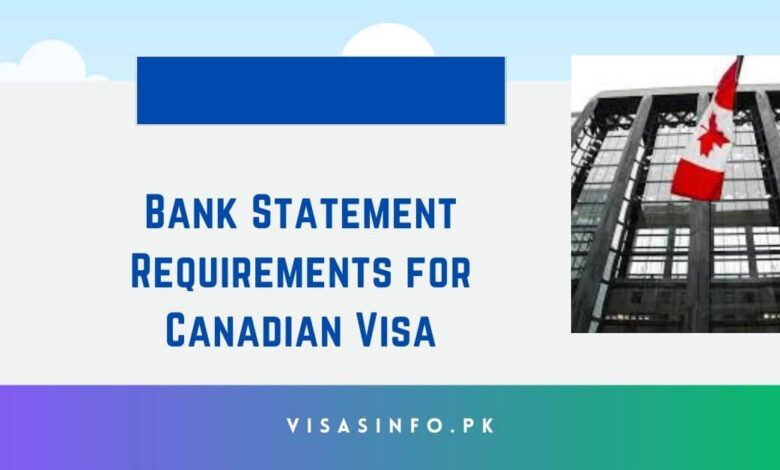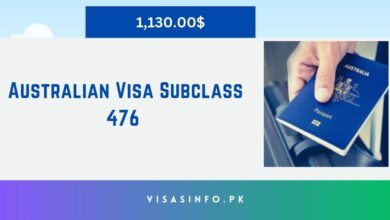Bank Statement Requirements for Canadian Visa 2024

Travelers who plan to visit Canada must be cognizant of the expense associated with obtaining a visa. In 2024, Canada will offer a variety of visas, each of which is designed for a specific form of travel. One of the most frequently asked queries from Canadian visa applicants is the amount of money they must have on file to have a reasonable chance of obtaining the visa, as well as the amount of money required for a 30-day stay in Canada.
Requirements for Canadian Visa
Minimum Bank Statement Required
When applying for a Canadian visa, there is no universally accepted minimum dollar bank balance requirement. Financial requirements can fluctuate for a variety of reasons. The minimal bank balance requirements for obtaining a Canadian visa are not uniform across many countries. The required funds are contingent upon a variety of critical factors, such as the duration of the intended stay, the individual’s circumstances, and the type of visa.
Student Visas
International students are typically required to provide evidence of adequate funds to cover their tuition, living expenses for a year, and potentially the cost of a round-trip ticket. Depending on the academic program and its location in Canada, the required amount can fluctuate considerably, ranging from CAD 10,000 to CAD 30,000.
Visitor Visas
There is no established minimum balance requirement. Nevertheless, applicants must prove that they have sufficient funds to cover their anticipated travel and accommodation expenses during their stay. This demands a thorough examination of all expenditures, such as lodging, meals, transportation, and any other day-to-day expenses that may arise during the visit.
Other Canadian Visas
The financial requirements for other categories of Canadian visas, such as business and labor visas, may vary significantly. They are frequently more detailed and contingent upon a variety of factors that are specific to the type of visa.
The evaluation of financial capacity in all circumstances extends beyond the straightforward presentation of a bank statement with an accurate balance. In addition to the applicant’s total financial background, immigration authorities will consider the applicant’s employment status, income level, and the number of financial dependents.
Beyond Bank Statements
Comprehensive Financial Review
Immigration officers evaluate financial stability, employment security, family support, and income sources. It is imperative to possess recent bank statements (within the past six months) that demonstrate prudent money management and consistent income.
Check Also: Major Canada Visa Changes
Acceptable Evidence of Financial Support for Temporary Residents for Canada visa
Temporary residents who are seeking a Canada visa have two primary options for providing evidence of acceptable financial assistance. Initially, valid forms of direct financial substantiation of the applicant’s capacity to support themselves during their visit are recognized as financial means of support, including money orders, certified checks, cash, or certified checks.
Furthermore, it is imperative to consider the significance of support statements, which may be provided by relatives or associates in writing or verbally. The applicant’s financial support during their visit to Canada is attested to by these declarations.
- First and foremost, bank documents, which are statements of bank or deposit records.
- Additionally, employment substantiation is provided by a job diary or employment letter.
- Furthermore, letters from employers or Revenue Canada Notice of Assessments serve as evidence of income for family members and hostesses.
Required Funds for a 30-Day Stay in Canada in 2024
Expenses for first-time travelers to Canada on any type of Canadian visa may differ based on a variety of factors, such as lodging, food preferences, travel routines, activities, and the type of visa. The following are typical cost estimates:
Accommodation Expenses
- Budget: $20 to $50 per night
- Mid-range: $80-$150 per night
- Luxury accommodations are priced at $200 or more per night.
Food Expenses
- Self-catering: $30 to $50 per day
Dining on a budget: $10 to $20 per meal
Mid-range dining: $20 to $30 per meal - Fine dining: $50 or more per lunch
Activities and Transportation
- Activities: $10 to $50 per activity
- Public transportation costs between $2 and $5 per trip.
- Taxis and Uber: $20 to $50 per travel
Overall Budget Estimates
- The minimum budget for 30 days is approximately $1800 to $2400.
- Moderate Budget: Approximately $3000-$4500 for 30 days.
- A reasonable budget for 30 days is approximately $6000 to $9000.
Before applying for a Canadian visa, it is imperative to meticulously evaluate the immigration authorities’ specific requirements. For the most accurate and current information, please visit the official website of Immigration, Refugees and Citizenship Canada (IRCC) or contact the Canadian visa office in your country.
It is essential to adhere to the most recent official guidelines to guarantee that all essential conditions for a successful visa application are satisfied, as immigration laws and regulations are subject to change.
Benefits of Minimum Bank Statement Requirements for Canadian Visa
- Proof of Financial Stability: A minimum bank statement requirement is necessary to guarantee that the applicant has sufficient funds to cover living expenses, accommodation, tuition (if applicable), and other necessities without requiring social assistance.
- Improved Visa Approval Probability: The likelihood of visa approval is increased by the demonstration of sufficient financial resources through bank statements, which demonstrates to the Canadian authorities that the applicant is financially prepared for their stay.
- Preventing Financial Stress: The process assists in preventing financial difficulties during the applicant’s time in Canada by mandating that they maintain a minimum balance in their bank account. It promotes the prudent planning and saving of individuals before their application.
- Establishing Trust with Immigration Authorities: The provision of transparent and legitimate bank statements fosters trust with Canadian immigration authorities. This transparency has the potential to expedite the visa application process.
- Promoting Responsible Financial Planning: The prerequisite motivates applicants to conduct their financial affairs responsibly. It encourages them to save money, budget effectively, and guarantee that they have the requisite funds before their travel.
- Support for Dependents: The bank statement requirement guarantees that the applicant’s family members will have sufficient funds to support them during their stay, thereby minimizing the risk of financial strain.
- Demonstrating Commitment to Stay: The applicant’s financial stability can also serve as an indication of their dedication to their time in Canada and their ability to complete the purpose of their visit, whether it be for business, education, or travel.
- Increasing Credibility: A robust financial statement enhances the credibility of the applicant’s profile, demonstrating that they are well-prepared and committed to their plans in Canada.
Frequently Asked Questions:
-
Is a 3-month bank statement enough for a Canada student visa?
Proof of a student or education loan from a bank is required. Please provide your bank statements for the last four months. Please provide a bank draft that you can exchange into Canadian dollars. This serves as proof that you have paid your tuition and housing fees.
-
How much funding do you need for a Canada visa?
Generally speaking, when applying for a tourist visa to Canada, you should have a balance of at least CAD 10,000, or Rs. 6,30,000. Please find below How much bank balance is required for a Canada Visitor visa from India. (Updated Jan 2024.)
-
Does the Canadian Embassy verify the bank balance?Contrary to common assumptions, the embassy does not verify your bank account directly. Instead, they request a few months of bank statements to assess your financial stability and history. Importantly, the embassy lacks the authorization to contact your bank directly, ensuring your financial privacy remains intact.



